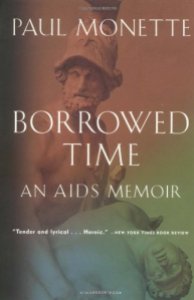I was born in the late 1980s and raised in the rural midwest; the U.S. AIDS epidemic was barely even on my radar growing up. I was too young and too removed from the fight that was going on in places like New York and LA. As a teenager, my education about the disease was limited and never touched on the powerful work of AIDS activists. Honestly, I still get the sense that my home community views it as primarily a “gay man’s disease” — a holy punishment carried out via death sentence. It’s simply not their problem.
I got my first real glimpse of this terrifying time period during a screening of How to Survive a Plague, a powerful documentary that follows the ACT UP and TAG organizations in New York. (If you have Netflix, it’s currently available for streaming.) Impassioned and wanting to learn more, I recently enrolled in a Coursera class on HIV & AIDS. The reading list included Paul Monette’s Borrowed Time: An AIDS Memoir. Instead of focusing on the community at large, this book narrows the scope to focus on one couple and how the disease personally affected their lives.
Pieced together from memories and journal entries, Borrowed Time tells the story of Paul and Roger’s life together in LA from roughly 1982-86. It begins with the first stirrings of the epidemic, when the two of them were likely infected but still blissfully unaware. How it went from a disease that seemed so vague and far away to being a prominent part of their social circle — bringing home the true scale of the epidemic.
It will be recorded that the dead in the first decade of the calamity died of our indifference. – Paul Monette
Chapter by heartbreaking chapter, it chronicles Roger Horwitz’s diagnosis in 1985, his doctors’ confusion, his battle to obtain experimental drugs (that sometimes did more harm than good), his deteriorating health, and eventually his death. All the while, the story is told through Paul’s acceptance of his own diagnosis, his effort to stay strong and take care of the person that he loves, and his denial that they’ve reached the end of their time together.
I won’t lie; this book was definitely a difficult read. My mood bottomed out for the better part of a week, and the ending filled me with more grief than anything else I’ve ever read. It was especially hard because I saw so much of my relationship in Paul & Roger and the way that they seemed so comfortable together, like they had truly found their other half. It forced me to imagine if my own love was taken by a disease that was shrouded in fear, stigma, and guess-work…with no answers in sight.
For those in my generation, raised during a time when the beginning of the AIDS story has ceased to be told, Paul’s account can feel like it occurs in an entirely different world — which is exactly why it is so important. We cannot allow these brave individuals and their struggle to be forgotten.


